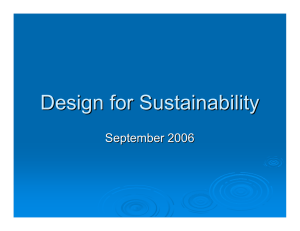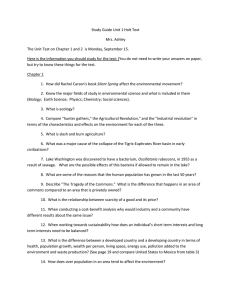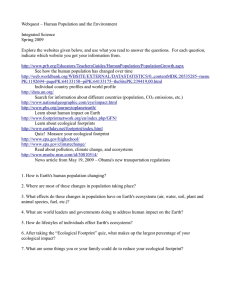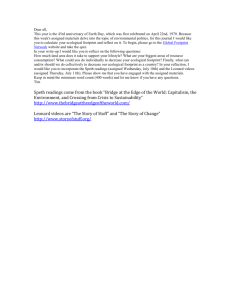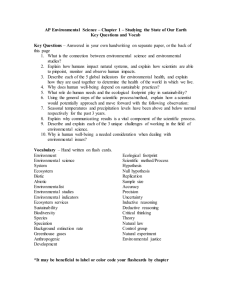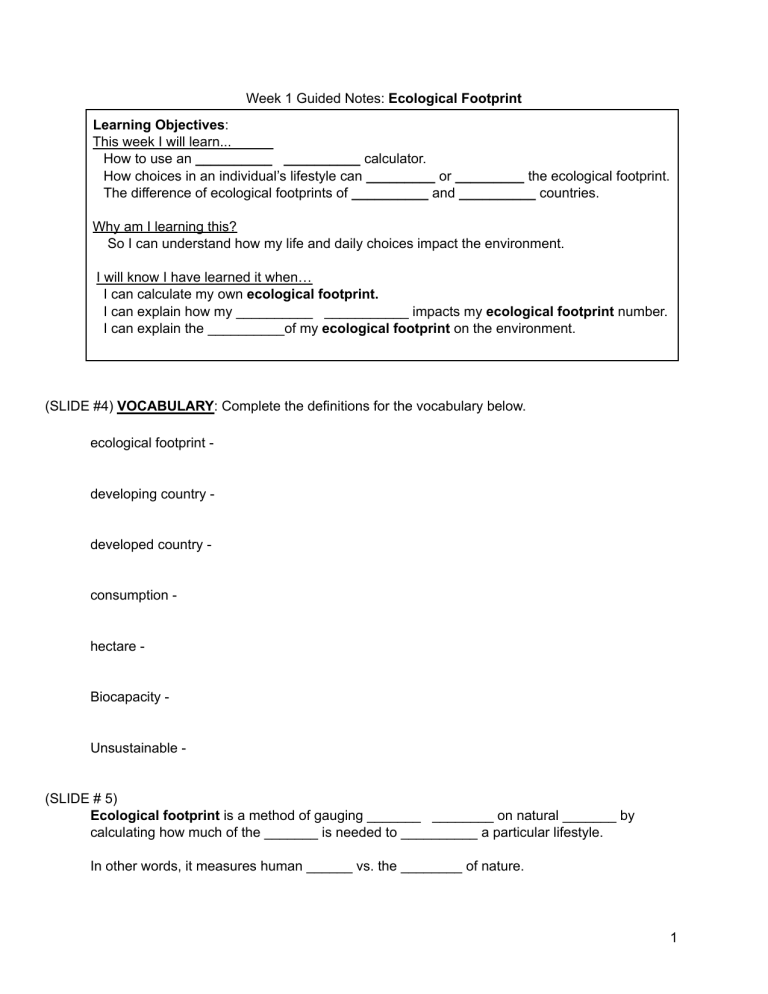
Week 1 Guided Notes: Ecological Footprint Learning Objectives: This week I will learn... How to use an __________ __________ calculator. How choices in an individual’s lifestyle can _________ or _________ the ecological footprint. The difference of ecological footprints of __________ and __________ countries. Why am I learning this? So I can understand how my life and daily choices impact the environment. I will know I have learned it when… I can calculate my own ecological footprint. I can explain how my __________ ___________ impacts my ecological footprint number. I can explain the __________of my ecological footprint on the environment. (SLIDE #4) VOCABULARY: Complete the definitions for the vocabulary below. ecological footprint - developing country - developed country - consumption - hectare - Biocapacity - Unsustainable - (SLIDE # 5) Ecological footprint is a method of gauging _______ ________ on natural _______ by calculating how much of the _______ is needed to __________ a particular lifestyle. In other words, it measures human ______ vs. the ________ of nature. 1 (SLIDE # 6) Sometimes we think that the Earth is so big that it can supply a ______ amount of __________ and other __________. . We cannot harvest food or other resources from ________ % of the Earth’s surface. A lot of land is _________ for growing plants or grazing animals. (SLIDE # 7) In fact, ________% of the Earth’s land surface is suitable for ____________food. Some land has become _________ for growing crops over time due to ________ , __________, or ____________. . _________ ___________are also making some areas that were previously fertile _________ __ _________ crops. (SLIDE #8) Why should I _______ about ecological footprint? ● ● ● At our current rate of consumption, we are using our resources at a rate of _____ %. This means that we would need just to maintain our current consumption. In order to preserve the resources that remain for future generations, it is that we our . (SLIDE #9) How to ● ecological footprint: can be calculated for , , or the entire ● , , . for ecological footprint are global biologically , (gha), which measure the amount of land with a productivity equal to the world average. (= of land) ● Measurement takes into account the resources a (2) clean up its needs to (1) produce and . (SLIDE #10) Now let’s calculate your ecological footprint. Click this: https://www.footprintcalculator.org/ 2 What was your Ecological footprint number? Please answer: ____________ What does that mean? Please answer:_____________________________________________________________________ ____________________________________________________________________________ (SLIDE # 11) ecological footprints of : As you might expect, the ecological footprint of a typical __________ is much _________ than that of a typical person from Gabon. As ____________ nations get ___________, they consume more _______ protein, drive more cars, and use more air conditioning, the estimates for those nations will rise quickly. With rising ____________ of developing nations, the rise of resource consumption globally will _________ the pace of ecological _________- reaching a point at which actual resource ____________ ____________ available planetary . SLIDE # 12) Why is there so much __________ among nations? Mostly, it comes down to ____________ lifestyle _______ (SLIDE # 13) _________ vs. ___________ countries: Developed ● ● ● ● ● ● ● ● High per capita _____________ Income ___________ and service based Low incidence of _________ ___________ standard of living Narrow income _____________ Low _______ _______ of population Low rate of ___________ ____________ capabilities are present ○ Social __________ _____ -healthcare, public assistance… 3 (SLIDE # 14) Developed vs. developing countries: Developing ● ● ● ● ● ● ● ● _________ per capita _________ Income mostly ___________ based _________ incidence of poverty _________ standard of living _________ income inequalities _________ population _________ rate of unemployment _________ infrastructure ○ Little or ____ social safety net- few hospitals, clinics, social programs (SLIDE # 16) Sustainability: Can the planet ______ us at our current global rate of consumption? ● An area is considered to be ________ if a land’s ecological footprint is greater than its ___________ (if demand for resources is_________ than the supply of nature) In short-____ , it can’t. ● We are currently gobbling up the Earth’s resources at an unprecedented and _______ rate. ● It is possible that ______ generations can be made ______ off by inheriting fewer resources from the current generation than they will need to sustain their populations. (SLIDE # 17) Making ___________ choices- moving closer to ____________ Every ____________ produces an individual ecological footprint that is determined mostly by the ___________ and level of ___________ in the ___________they live in. The more developed a country is, the _________ ecological ___________ it’s going to have. However, the___________ we make in our daily lives can also make a big ___________ . Our daily activities, such as driving a car, washing clothes, watching TV, or running a factory, can all _____________ to a large ecological footprint. 4 (SLIDE # 18) Making better choices- moving closer __________ Generally, we can _________ our negative ________ on the planet by _____________ our consumption of resources and reducing pollution. Using resources that can be quickly _____________ is a way to achieve sustainability. To achieve sustainability, we need both sustainable _____________, and also need to make sustainable _____________. (SLIDE # 19) Making better choices- moving closer to sustainability. The first step can be as simple as ● ● ● ____________ - use less, maybe just pick one thing that you can use less of. ○ Electricity- how can I use less during the day? LED light bulbs, change house temp ○ Pay more attention to food choices? Animal vs, vegetable, food waste (ugly food)… ○ Take a shorter shower- by two or three minutes? ______________ ○ Find a way to repurpose or upcycle? Clothing, plastics… ○ Repair instead of replace- phone, clothing ______________ ○ Repurpose something that would otherwise end up in the trash ○ Sort items that can be recycled so that their resource can be used again and again. ■ Aluminum cans, paper, copper... 5
